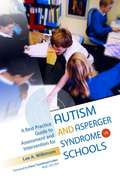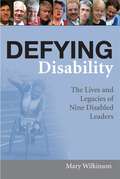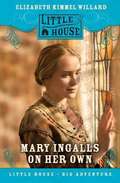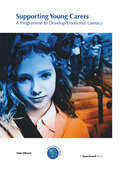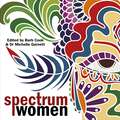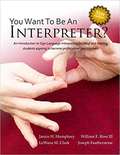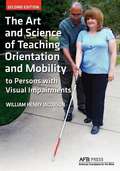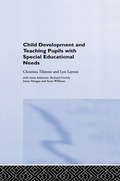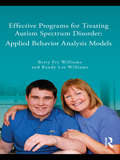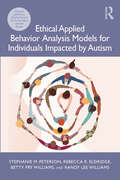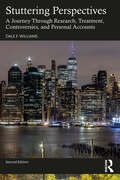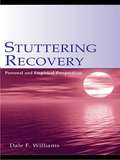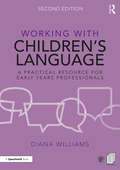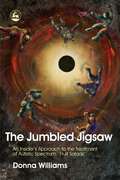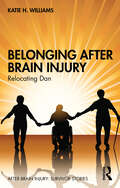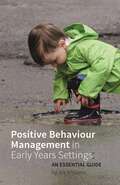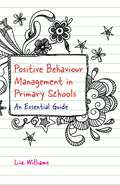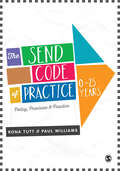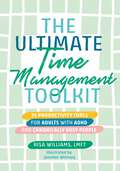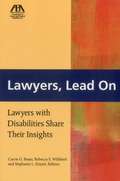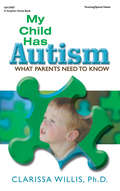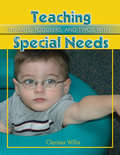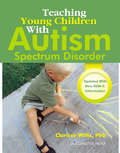- Table View
- List View
A Best Practice Guide to Assessment and Intervention for Autism and Asperger Syndrome in Schools
by Lee A. Wilkinson*Winner in the Education/Academic category of the 2011 Next Generation Indie Book Awards**Shortlisted for the 2011 NASEN Award 'The Special Needs Academic Book'*With a focus on best practice and the importance of early diagnosis, this book provides a practical and scientifically-based approach to the assessment and diagnosis of Asperger Syndrome and autism spectrum conditions. This book offers a balance of conceptual, practical and empirical information designed to bridge the research-to-practice gap in identifying, assessing, and treating school-aged children with autism-related conditions. Assessment tools and intervention strategies will support school-based professionals in:· identifying and assessing young people with high-functioning autism spectrum conditions· developing and implementing classroom-based intervention programs· initiating a dialogue between parents and teachers· accessing community resources· promoting special needs advocacy. With illustrative case studies, FAQs, quick reference boxes, and a glossary, this accessible guide will appeal to teachers, counsellors, psychologists, social work practitioners and students.
Defying Disability: The Lives and Legacies of Nine Disabled Leaders
by Mary WilkinsonThis book tells the stories of nine disabled leaders who, by force of personality and concrete achievement, have made us think differently about disability. Whatever direction they have come from, they share a common will to change society so that disabled people get a fair deal. There are compelling biographies of: · Sir Bert Massie: public servant · Lord (Jack) Ashley: Labour politician · Rachel Hurst: activist and campaigner · Tom Shakespeare: academic · Phil Friend: entrepreneur and business consultant · Peter White: broadcaster · Mat Fraser: actor, musician and performer · Andrew Lee: activist and campaigner · Dame Tanni Grey-Thompson: Paralympic champion Defying Disability is based on extensive interviews with the subjects and the people who know them. It marks their similarities and differences, the forces that drove them to achieve, the impact they have had on policies and practice, and how the modern history of disability in the UK has been played out in their lives. Defying Disability is not just a good read; it will inform professionals in the field, students in disability studies, disabled people, their families and carers, and everyone interested in disability politics and policies.
Mary Ingalls on Her Own
by Elizabeth Kimmel Willard(back of book)ages 8-12 MARY INGALLS lost her sight after a devastating bout of scarlet fever. Now Mary has the opportunity to attend the Iowa College for the Blind, where she will get a fresh start with her education and can learn the skills she needs for an independent future as well. It seems like a dream come true. But it also means leaving her cherished family behind in Dakota Territory, including her sister Laura. Laura's feisty personality has always complemented Mary's quiet nature, and ever since Mary lost her sight Laura has served as Mary's "eyes" to the world. Now that she's on her own, Mary must learn to get along without her beloved sister, and in the process realizes that she may have a bit of Laura's spunk in her after all. For the first time, readers will get a glimpse into the life of Mary Ingalls and will discover a whole new side of this Little House sister they've gotten to know through Laura Ingalls Wilder's classic Little House books.
Supporting Young Carers: A Programme to Develop Emotional Literacy
by Clare WillcockThis easy to use resource pack is designed for young people aged 6-16 who have a caring responsibility for someone at home. It is best used during one-to-one support sessions. Topics covered include: caring and emergencies, school and friends, personal health, support at home and ways of coping, identifying feelings, self-esteem and self image. By increasing the young person's self-knowledge and recognition of feelings as well as offering practical suggestions and information, this pack enables the young carer to review their own situation, to feel more in control and to come to their own decisions regarding any change that might benefit them.
Spectrum Women: Walking to the Beat of Autism
by Liane Holliday Willey Anita Lesko Dena Gassner Christine Jenkins Artemisia Jen Elcheson Catriona Stewart Samantha Craft Kate Ross Becca Lory Renata Jurkevythz Terri Mayne Maura Campbell Yenn PurkisBarb Cook and 14 other autistic women describe life from a female autistic perspective, and present empowering, helpful and supportive insights from their personal experience for fellow autistic women. Michelle Garnett's comments validate and expand the experiences described from a clinician's perspective, and provide extensive recommendations.Autistic advocates including Liane Holliday Willey, Anita Lesko, Jeanette Purkis, Artemisia and Samantha Craft offer their personal guidance on significant issues that particularly affect women, as well as those that are more general to autism. Contributors cover issues including growing up, identity, diversity, parenting, independence and self-care amongst many others. With great contributions from exceptional women, this is a truly well-rounded collection of knowledge and sage advice for any woman with autism.(P)2022 Hodder & Stoughton Limited
So You Want to be an Interpreter
by William F. Ross Jan Humphrey LeWana Clark Joseph FeatherstoneSo You Want to be an Interpreter is unlike any other entry-level textbook on the market. This new 5th edition has been revised and updated with the latest research and instructional content by the work of a team of authors who have over 150 years of experience interpreting and teaching. They were joined by invited guest authors and members of a Deaf interpreter focus group who have shared insightful contributions as well as feedback from recognized leaders in the profession, past and present. Together their expertise makes this the cutting-edge textbook for Deaf and hearing students studying to become sign language interpreters. The number one student textbook in Interpreter Training Programs and the premier study material for RID and AVLIC written certification exams.
The Art and Science of Teaching Orientation and Mobility to Persons with Visual Impairments
by Henry Jacobson WilliamThe second edition of this popular and classic text, now updated for the 21st century, provides a complete manual for the beginning O&M instructor that serves as a reference for the experienced practitioner as well. An invaluable guide for teaching travel techniques to students of all ages, the second edition of The Art and Science of Teaching Orientation and Mobility provides step-by-step presentations of each O&M technique and describes in detail how to individualize and teach each one; outlines the scope and sequence of a complete O&M curriculum; offers a guiding philosophy as well as principles and strategies for effective teaching; includes a new chapter on assessment and provides more extensive content on today's more challenging traffic environment.
Child Development and Teaching Pupils with Special Educational Needs
by Anna Williams Christina Tilstone Anne Anderson Richard Gerrish Lyn Layton Jenny MorganA thought-provoking book which provides a framework for understanding the physical, sensory, emotional, social, linguistic and cognitive development of children with special educational needs. It gives practitioners and students a sound grasp of the theoretical ground needed to fully understand cognitive development and will help them track children's developmental progress in order to optimise learning opportunities. The authors handle complex topics in a highly accessible manner, explaining how to put theory into practice. In three lucidly argued sections they present: an overview of the work of key theorists and thinkers, including Vygotsky, Piaget, Freud, Erikson, Bruner and the Korning theorists an evaluation of the educational implications of the work of each theorist, using illustrative case studies a consideration of areas of development in learning and teaching children with special educational needs. This book will be a beacon for teachers, head teachers, educational psychologists and all practitioners involved in special needs education who seek the opportunity to help empower their pupils, and enhance their own understanding.
Effective Programs for Treating Autism Spectrum Disorder: Applied Behavior Analysis Models
by Betty Fry Williams Randy Lee WilliamsEffective Programs for Treating Autism Spectrum Disorder is written for teachers, parents, and the many service providers who work with individuals with autism spectrum disorder (ASD). Part one reviews the characteristics of ASD, summarizes major theories and research findings regarding cause(s) of ASD, and discusses the most popular treatment claims, examining each approach's scientific base and value. Part two provides an informative overview of applied behavior analysis, focusing on the principles of learning and basic procedures based upon those principles. These two parts provide a foundation for understanding the strategies implemented by the outstanding treatment programs described in Part three. The eight models described in Part three represent comprehensive, evidence-based programs for the treatment of persons with ASD, from infancy through adulthood. Programs reviewed include the Lovaas Institute, Koegel Center, Strategic Teaching and Reinforcement Systems (STARS), Project DATA, New England Children's Center, May Institute, Princeton Child Development Institute, and Judge Rotenberg Center. Strategies explained include intensive early behavioral intervention, Pivotal Response Training, verbal behavior, script fading, social stories, visual activity schedules, functional analysis, the Picture Exchange Communication System, and the Family-Teaching Model.
Ethical Applied Behavior Analysis Models for Individuals Impacted by Autism
by Betty Fry Williams Randy Lee Williams Stephanie Peterson Rebecca EldridgeEthical Applied Behavior Analysis Models for Individuals Impacted by Autism provides teachers, parents, and behavior analysts with a comprehensive analysis of evidence-based, behavior analytic programs for the therapeutic treatment of persons with autism, from infancy through adulthood. Chapters review the characteristics of autism spectrum disorder (ASD), behavior analytic concepts and interventions, and discuss the eight different effective treatment programs, examining each approach's scientific base and value. Fully updated to reflect current research and understanding of autism, this second edition includes new chapters on evaluating high-quality behavior analytic programs, as well as explorations of programs covering the verbal behavior approach and those specially designed for adults.
Stuttering Perspectives: A Journey Through Research, Treatment, Controversies, and Personal Accounts
by Dale F. WilliamsStuttering Perspectives is a highly engaging book that interweaves discussion and research about stuttering with personal accounts. Written in a reader-friendly and informal style, the book considers stuttering from a variety of angles, providing the reader with a nuanced and holistic view. In this way, topics such as therapy, support groups, listener reactions, and many others are not only explained within the context of current research, but also illustrated with lively examples demonstrating the stuttering experience. Fully updated in its second edition, the book includes new stories, additional discussion questions, and inclusion of contemporary stuttering issues not contained in the original version. This book is highly relevant reading for speech and language professionals, as well as students of communication sciences and disorders. It will also be of great interest to people who stutter and anyone with an interest in fluency disorders.
Stuttering Recovery: Personal and Empirical Perspectives
by Dale F. WilliamsStuttering Recovery: Personal and Empirical Perspectives is a highly original and engaging book serving to not only educate readers on topics related to stuttering, but also to stimulate discussion. The author interweaves personal accounts of people who stutter with informational chapters highlighting up-to-date research on recovery-related issues such as therapy, support groups, listener reactions, risk-taking, and dealing with family members and significant others.Reader-friendly and understandable, this book incorporates various perspectives to teach and illustrate the different aspects of recovery. Chapters are paired with stories presenting all sides of the recovery process -- the humorous and serious, the uplifting and frustrating, the thoughtful and emotional, and everything in-between. The result is a text that is entertaining and instructive.Stuttering Recovery: Personal and Empirical Perspectives is intended for undergraduate and graduate students, clinicians, speech-language professionals, people who stutter, significant others, and anyone else who has an interest in fluency disorders.
Working with Children’s Language: A Practical Resource for Early Years Professionals (Working With)
by Diana WilliamsThis revised and updated second edition of Working with Children’s Language has been created to support practitioners who work with young children with delayed language acquisition. Rooted in a developmental theory of language learning, it covers topics such as attention control and listening, the role of play, verbal comprehension and the acquisition of spoken expressive language. Each chapter offers a straightforward overview of current research relating to the specific language skill before introducing a wealth of targeted games and activities that can help support the development of those skills. Key features include: • A structured approach to language learning that can be followed as a programme or adapted for informal use by individual practitioners. • Accessible activities, games and ideas suitable for small group or individual intervention, linked to specific aims based on developmental norms. • Photocopiable and downloadable resources, including a record sheet to track progress in each skill against aims and outcomes for individual children. Clearly linking theory and practice in an engaging and easy-to-follow format, this is an invaluable resource to support children in early years settings and Key Stage 1 whose language is delayed, but who are otherwise developing normally. It is a must-have book for early years practitioners, teachers, SEND professionals and speech and language therapists with varying levels of experience.
The Jumbled Jigsaw: An Insider's Approach to the Treatment of Autistic Spectrum `Fruit Salads'
by Donna WilliamsThe Jumbled Jigsaw exposes autism spectrum disorders (ASDs) not as single entities but as a combination of a whole range of often untreated, sometimes easily treatable, underlying conditions. Exploring everything from mood, anxiety, obsessive-compulsive and tic disorders to information processing and sensory perceptual difficulties, including dependency issues, identity problems and much more, Donna demonstrates how a number of such conditions can combine to form a 'cluster condition' and underpin the label 'autism spectrum disorder'. Donna Williams encourages and empowers families to look at what they can do to change their child's environment to address anxiety, overload and other issues. She also gives carers the necessary information to navigate the booming autism marketplace and demand the right tools for the job. The author also challenges professionals to adopt a multi-disciplinary approach to identifying and treating the cluster conditions that make up an autism spectrum diagnosis, and to improve service delivery to those in need. The Jumbled Jigsaw is a call to modern society to take responsibility and accept diversity. It is written in a very human and user-friendly way for parents and for Auties and Aspies themselves, but it is also aimed at carers, professionals, policy-makers and service providers.
Special Education: Case by Case (3rd edition)
by Gwen Williams Conn Thomas Janice Seabrooks Len RobersonSpecial Education: Case by Case will help you develop your abilities as a teacher of students with disabilities by presenting many of the challenging situations you will find in your own classroom. Through these case studies, you will hone your skills as a teacher who puts students first and plans for their unique learning needs.
Belonging After Brain Injury: Relocating Dan (After Brain Injury: Survivor Stories)
by Katie H. WilliamsBelonging After Brain Injury: Relocating Dan explores the life of the author’s brother who has dealt with the effects of a severe traumatic brain injury (TBI) for over four decades. It recounts the institutional, psychological, and social labyrinths he and his family have navigated following the TBI he sustained at the age of eighteen. This insightful volume offers a holistic account of the impact of TBI on the survivor and his family. It reveals the difficulties a TBI survivor has had to endure and provides practical information about physical, psychological, and psychosocial symptoms and their consequences. Dan’s story offers new perspectives and strategies that will help alleviate seemingly intractable problems and highlights the central importance of forming connections with others in order to lead a fuller life. The author’s account of her own journey, learning to help care for and advocate for Dan, offers an invaluable guide for TBI survivors and those who care for and support them. Belonging After Brain Injury: Relocating Dan will be of interest to TBI survivors and their families. Its rich insights will be essential reading for medical and mental health professionals, as well those involved in the care and rehabilitation of TBI survivors and families.
Positive Behaviour Management in Early Years Settings: An Essential Guide
by Liz WilliamsDrawing on her extensive practical experience, Liz Williams provides a highly accessible and much-needed guide to promoting positive behaviour in early years settings. In this book, she explains why children may act in the way that they do and how behaviour should be understood differently in children of different ages. She demonstrates that social and emotional capacities differ greatly in these crucial development years and how this impacts on the support needed at each stage. The book considers a host of factors influencing positive behaviour, such as environments and the importance of planning, and looks beyond the child to show the vital role that staff and parents have in promoting appropriate behaviour. Written in clear and understandable language, this book is full of ideas that early years workers can easily implement in their day-to-day work.
Positive Behaviour Management in Primary Schools: An Essential Guide
by Liz WilliamsThis highly accessible and much-needed resource sets out practical advice on positive behaviour management in primary schools, exploring how to support children effectively with their personal, social and emotional development. With an emphasis on implementable strategies, this book will give primary school teachers and staff an understanding as to why children may behave as they do, and what steps can be taken by the school to support a child's development. Considering a variety of factors that influence positive behaviour, such as environment, mental health, parents, and the importance of planning, this book is full of ideas that can be dipped in and out of for support in the classroom. Bite-sized and practical, this is a perfect book for busy teachers.
The SEND Code of Practice 0-25 Years: Policy, Provision and Practice
by Paul Williams Rona TuttConsidering it for your course reading list? Lecturers can order their e-inspection copy here today! How have you found the changes brought about by the new SEND Code of Practice: 0-25 years (2014)? This book is the ultimate guide to making sure that you are not only meeting the requirements, but are improving outcomes for children and young people as well. Written for all professionals working in the field, it covers: · The broader Children and Families Act (2014) · The role of the local authority · Guidance on all the key changes that school leaders, SENCO's, and staff are concerned about · Case studies of settings across the 0-25 age range, including maintained schools, academies, free schools, and specialist and alternative provision. Whether you work in education, health, or social care, or are training to do so, this book will genuinely improve your provision and practice for children and young people with SEND.
The SEND Code of Practice 0-25 Years: Policy, Provision and Practice
by Paul Williams Rona TuttConsidering it for your course reading list? Lecturers can order their e-inspection copy here today! How have you found the changes brought about by the new SEND Code of Practice: 0-25 years (2014)? This book is the ultimate guide to making sure that you are not only meeting the requirements, but are improving outcomes for children and young people as well. Written for all professionals working in the field, it covers: · The broader Children and Families Act (2014) · The role of the local authority · Guidance on all the key changes that school leaders, SENCO's, and staff are concerned about · Case studies of settings across the 0-25 age range, including maintained schools, academies, free schools, and specialist and alternative provision. Whether you work in education, health, or social care, or are training to do so, this book will genuinely improve your provision and practice for children and young people with SEND.
The Ultimate Time Management Toolkit: 25 Productivity Tools for Adults with ADHD and Chronically Busy People (Ultimate Toolkits for Psychological Wellbeing)
by Risa WilliamsDo you find time constantly slipping away from you? Or does completing a to-do list feel totally unachievable? We all have 24 hours in a day, but sometimes putting them to good use can feel like an impossible task. The Ultimate Time Management Toolkit is here to change that!Written by a clinical therapist and author of The Ultimate Anxiety Toolkit, this book focuses on practical methods and strategies, including creative worksheets and easy to use techniques, to help you find your motivation, achieve your goals and feel less stressed about organizing your time.With 25 different techniques based on CBT, mindfulness and narrative therapy, you can find out which strategies work best for you to help transform how you use your time and learn how to feel empowered to make positive changes to habits in your daily life.
Lawyers, Lead On: Lawyers with Disabilities Share Their Insights
by Rebecca S. Williford Carrie A. Basas Stephanie L. EnyartThis inspiring book contains letters of encouragement and advice from lawyers with disabilities to law students and new lawyers with disabilities. The writers share their perspectives on work and disability, based on their own experiences of success and setbacks.
My Child Has Autism: What Parents Need to Know
by Clarissa Willis"Autism isn't something a person has, or a 'shell' someone is trapped inside. There is no 'normal' child hidden behind the autism... Autism is a way of being." --Jim SinclairThere are no words to describe how families feel when they learn that a child they love has been diagnosed with autism. This book was written for those families. It explains autism in simple terms, discusses the major characteristics associated with autism, and offers simple strategies for helping children with autism function in their homes, at school, and in the community.With the help of this book, families will begin to understand the puzzle called autism. It provides strategies for families to help their child:* Learn to be independent * Succeed in school * Build social skills * Communicate with othersAlthough there is no cure for autism, there is certainly hope. My Child Has Autism provides strategies that are the result of Clarissa Willis' 30 years of experience working with children with autism and their families, as a teacher, speech pathologist, early interventionist, and consultant.
Teaching Infants, Todders & Twos with Special Needs
by Clarissa WillisPlacing children with special needs in environments that include typically developing peers has become commonplace as continuing research confirms that all children benefit and learn from each other as well as from their teachers. Teaching Infants, Toddlers, and Twos with Special Needs is written for all teachers and directors who work with infants, toddlers, and twos, including special educators and educators working with typically developing children. This book specifically addresses the needs of children with developmental delays, as well as children at risk for developing special needs. Each chapter in Teaching Infants, Toddlers, and Twos with Special Needs includes information about how young children learn. The strategies and adaptations in each chapter are easy to use and apply to all children. Examples are presented for managing the physical environment and for teaching skills that will enhance the overall development of infants, toddlers, and twos with special needs.
Teaching Young Children with Autism Spectrum Disorder
by Clarissa WillisWhat do you do when a three-year-old with autism falls on the floor kicking and screaming? How do you communicate with a child who looks away and flaps his hands? Who can help if you suspect a child in your class has autism? Preschool can be overwhelming for a child with autism. Autism affects how a child communicates, behaves, and relates to others. Teachers need to know what they can do to help children with autism reach their full potential. Teaching Young Children With Autism Spectrum Disorder is a straightforward, easy-to-understand guide to working with children who have autism. It explains the major characteristics associated with autism and helps teachers understand the ways children with autism relate to the world. Each chapter offers specific strategies for teachers to use, including setting up a proactive preschool environment, helping children learn life skills, managing behavior, helping children with autism communicate, encouraging children with autism to play, helping them to get along with others, and working with families. Teaching Young Children With Autism Spectrum Disorder helps teachers connect with all children in meaningful ways, allowing children with autism to learn and grow. Updated with new DSM-5 information.
